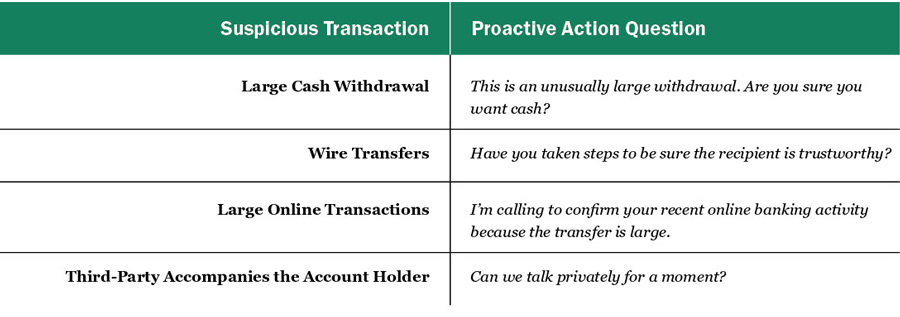Growing up in a small town with four locally owned banks occupying the town square, you could always count on the bankers to lead and support local fundraisers, sports teams and community events. These local banks were more than just businesses; they were the roots of our small community, providing guidance and support to the first-time home buyer as well as the little leaguer who struck out. Bankers were community heroes whose actions reverberated through our community.
After college, I joined a local bank and quickly learned that one of the most critical decisions was choosing the color of our baseball caps for the year. Should we go with camo or safety orange? The bank president took great pride in seeing the community wear our caps, a symbol of our connection and support. Over the years, bank names have changed, cap preferences have evolved beyond hunting or farming themes, and banking has evolved to include online transactions and cyber threats/fraud. Still, the community connection to the local bank remains.
My 95-year-old mother recently called me with a touching story. Her banker had contacted her about a $40 check she had written. Noticing that she doesn’t write many checks, they wanted to ensure it was authorized. This simple act of care and vigilance reminded me of the deep-rooted connection and trust that local banks have fostered. She was thrilled that the banker had called, and she reminded me that there were a lot of scammers out there and that the people at the bank were looking out for her. My mother has never fully understood my role as a cybersecurity consultant at SBS CyberSecurity; she knows it has something to do with banking and computers, and I leave it at that. At SBS, we’re all about empowering you to make informed decisions regarding cybersecurity. So, I felt the hand of karma when she replayed her conversation with me. To the unknown cybersecurity superhero who contacted my mother, thank you for taking the time and resources to verify her $40 check. Most frauds start with a small amount to test the system, and your bank has trained you well.
For bankers who may not be as well-versed as our hero or would like additional information on elder financial abuse, we hope the following statistics underscore the critical need for vigilance and protective measures to safeguard older adults from financial exploitation:
- Approximately 5.2% of seniors experience financial fraud or exploitation each year.
- Older adults lose more than $36.5 billion annually to financial fraud. The average loss per incident is around $35,101.
- Between June 2023 and January 2024, there were about 15,993 reports of elder financial exploitation per month.
- Seniors with disabilities are nearly twice as likely to experience financial abuse. Additionally, nonwhite seniors are 200% more likely to be victims compared to white seniors.
Today, bankers often find themselves becoming cybersecurity superheroes, providing cyber education to their customers via their website, social media and often over the phone for individuals who are victims of identity theft or email compromise. As trusted cybersecurity experts, bankers play a crucial role in preventing elder financial abuse by implementing effective strategies such as:
- Training employees to recognize signs of financial abuse, such as unusual withdrawals, sudden changes in account activity or new authorized signers.
- Encouraging customers to designate a trusted contact person who can be notified if suspicious activity is detected.
- Working closely with local Adult Protective Services (APS) and law enforcement to report suspected abuse and expedite investigations.
- Offering educational programs.
Well-trained bankers are positioned to prevent and respond to elder financial abuse. They play a key role because they know their customers, often have face-to-face interactions with older customers who make transactions and have the technology to detect when an elder account holder has been targeted or victimized.
Proactive action steps to prepare for elder financial exploitation include, but are not limited to:
- Tips on immediate steps for frontline staff, such as scripted questions to ask customers, calling 911 if the account holder appears to be in immediate danger and instructions for effectively documenting details.
- Internal response sequences for alerting appropriate staff throughout the organizational hierarchy.
- Action steps for reporting to law enforcement.
Train cybersecurity superheroes on how to prevent potential elder abuse depending on the situation encountered by asking the customer to explain or verify the transaction, for example:

On a compliance note, bankers are mandated reporters of suspected elder financial exploitation under many states’ laws and Federal BSA laws. In fact, FinCEN identified SARs as valuable avenues for financial institutions to report elder financial exploitation.
Bankers wishing to assist their customers further may find the following resources helpful:
- Call the Elder Fraud Hotline at (833) 372-8311, or visit the website by clicking the link.
https://www.justice.gov/elderjustice/financial-exploitation - Consumer Financial Protection Bureau (CFPB): Offers a guide for reporting elder financial abuse and other resources for older adults. Check out their guide by clicking the link.
https://www.consumerfinance.gov/consumer-tools/educator-tools/resources-for-older-adults/reporting-elder-financial-abuse-guide/ - Eldercare Locator: A service from the U.S. Administration on Aging that helps connect older adults to local services, including Adult Protective Services. You can reach them by calling (800) 677-1116 or by clicking the link.
https://eldercare.acl.gov/Public/Index.aspx - Investopedia: This website provides information on financial elder abuse, its meaning, signs and prevention. For more details click the link.
https://www.investopedia.com/terms/f/financial-elder-abuse.asp - AARP: Offers resources and information on protecting older adults from financial exploitation. Visit www.aarp.org for more details.
Community bankers should be prepared to accept the superhero cape as an analysis of the Census Bureau’s National Population Projections estimates that the population aged 65 and over is expected to reach nearly 75 million, or one-fifth of the total population, by 2030. In the coming decade, there are projections that the number of rural older adults will continue to increase as baby boomers migrate from the big city to rural communities and small towns across America. We recommend reviewing the U.S. Department of Justice’s Elder Abuse Statistics for more insights.
At SBS, we have a team of over 80 exceptional experts dedicated to delivering industry-leading, quality education that instills confidence and empowers you to take cybersecurity into your own hands. Our consistent training programs for your employees, board of directors and even your customers help establish trust that your organization takes cybersecurity seriously.
Now, for the most important decision of your banking career: Do you prefer a camo cape or the safety orange cape?









